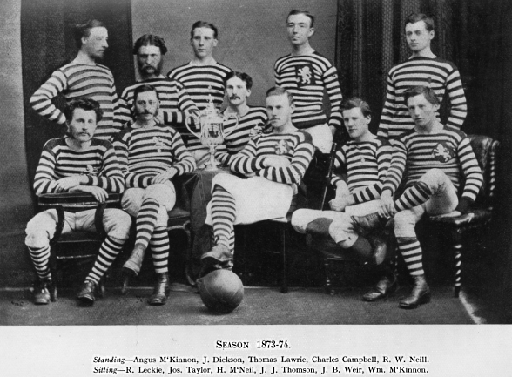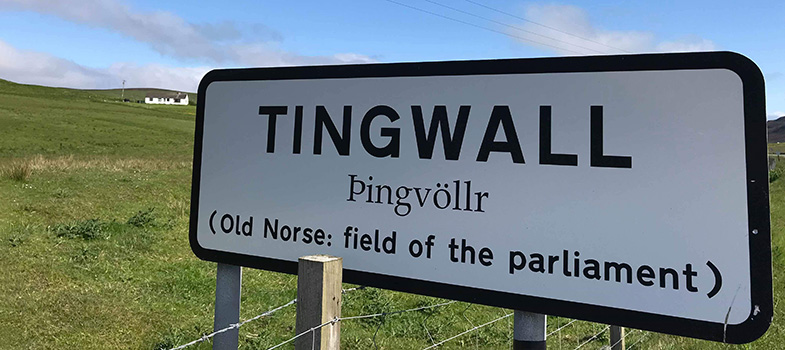8.4 The Game of Fitba
Football plays a hugely important role in Scottish culture and has for a long time. It is widely covered in the media. Nevertheless, here we are presenting you with some facts about Scottish football you might not yet have come across. You will look at the men’s game but also at the turbulent history of women and football in Scotland.
Activity 9
To start with, you will once again work with some key Scots words related to the game of fitba. Here is a Scots word and example sentence for you to learn.
Ba [Tip: hold Ctrl and click a link to open it in a new tab. (Hide tip)]
Definition: forms of ball, with meanings partly as in St.Eng., partly peculiar to Sc. 1. Football as in Eng. Gen.Sc.
Example sentence: “That useless tumshie couldnae kick the ba.”
English translation: “That player who is as useful as a turnip could not kick the football.”
Click to hear the sentence above read by a Scots speaker.
You can then make your own recording and play it back to check your pronunciation.
Transcript
Listen
That useless tumshie couldnae kick the ba.
Model
That useless tumshie couldnae kick the ba.
Go to the Dictionary of the Scots Language for a full definition of the word.

Language links
Ba is an example of a word which has cognates in many other European languages. It is often combined with words such as ‘hand’ or ‘foot’ to create names for objects or the game in which the object is used e.g. ‘handball’ and ‘football’. Note that the handball of Scotland bears no relation to the modern indoor sport played in Central Europe. The Scottish game is an ancestor of Squash.
The ba can apply to both the equipment and the game itself. In many parts of Scotland there are examples of ancient ba games which bear little relation to the Association Football code which was invented in Scotland.
A word sometimes related to ba – especially in live commentaries, and which you came across in the first example sentence of this activity is:
Definition: A jocular or colloq. name for a turnip (m. and s.Sc. 1973).
Go to the Dictionary of the Scots Language for a full definition of the word.
Language links
Tumshie is a good example of an ordinary term in Scots being used metaphorically in a pejorative fashion: as a piece of invective. The term appears to derive from the English ‘turnip’ and now has the definition of a contemptuous word for an idiot or someone of little use or skill. Football also provides us with related Scots phrases such as ‘ya lump a wid’ (you lump of wood), ‘he couldnae tackle a bag of cement’ (he could not even tackle an inanimate object) or ‘he’s a big stookie’ (he is as mobile as a scarecrow’).
Activity 10
Now find out about some historical aspects of the game of Fitba in Scotland. Former Open University student John Simkin wrote this summary of the early days of more formally organised Scottish men’s football.
While reading, take a note of things that are new to you, and of things that have not changed much since the early days of football in Scotland.
“The first international [men’s] football game [was] played on the 30th November, 1872 [at the West of Scotland Cricket Club with 4000 spectators]. [A] team of English born players [were to] play against a team from Scotland. The match, played in Glasgow, ended in a 0-0 draw. The main objective was to publicize the game of football in Scotland. It had the desired effect and the following year the Scottish Football Association was formed and the England-Scotland match became an annual fixture.
Initially, the Scottish Football Association comprised of eight clubs, 3rd Lanarkshire Rifle Volunteers, Clydesdale, Dumbreck, Eastern, Granville, Kilmarnock, Queen's Park and Vale of Leven. The SFA established a challenge cup and this was won by Queen's Park in its first year. Queen's Park also entered the FA Cup in its first season and reached the final in 1884 and 1885. Both times they lost to Blackburn Rovers. […]
The Scottish League was established in 1890. Since 1890 Glasgow Rangers and Celtic have dominated the competition. […]
Major William Sudell, the manager of a local factory in Preston, became the secretary of Preston North End. Sudell decided to improve the quality of the team by importing top players from other areas. This included several players from Scotland. […] In an attempt to stop this migration of players, the Scottish Football Association made it clear that it would not select players for the Scotland international side who played in England. This action failed to stop footballers moving south. […]
Between the First and Second World Wars, Scotland emerged as the leading football power in Britain. Their chief rivals were Wales who won the championship six times between 1920 and 1937.”
Answer
This is a model answer. The aspects you have listed might be different.
I did not know that the first men’s international football match ever played was played in Glasgow between Scotland and England and that as a result of this match the Scottish Football Association was formed. I also found it interesting to read how annual competitions in football might go back to this match, as it became an annual fixture at the end of the 19th century. It was also new to me that there were eight clubs in the first Scottish football league and that one of them is still in the Scottish Premier League: Kilmarnock. I was surprised to read that the FA Cup has such a long history and that in the early days of club football clubs from Scotland and England played in this competition together.
Interestingly, there are a number of things in Simkin’s text that have not changed much to this day:
- good Scottish players often still go south to play in England
- Celtic and Rangers are still dominating the Scottish league
- the FA Cup still exists
- and clubs like Kilmarnock and Queens Park Rangers still exist
8.3 The Game of Bools
